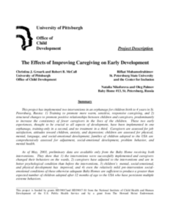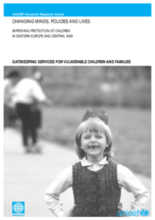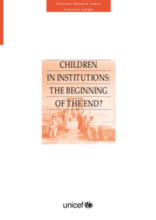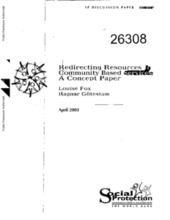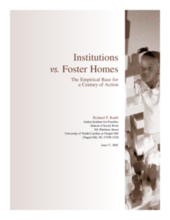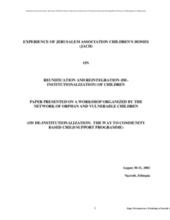Displaying 631 - 640 of 665
Country report of Russia on the situation of children in residential care in anticipation of the Second International Conference on Children and Residential Care: New Strategies for a New Millennium, to be held in Stockholm 12 – 15 May 2003.
A research study on the policies, finances and current state of care of vulnerable children in Tajikistan. Includes data on budgeting and expenditures around institutional care, as well as recommendations for the creation of short-term and long-term care alternatives.
Through a review of orphanages in St. Petersburg, Russia, this study examines the causal roles of consistency in caregivers and appropriate caregiving behaviors in the social, emotional, and development of young children.
Practical guidance, case examples, and tools to assess, monitor, and evaluate child protection services and facilitate reform away from institutionalization of children.
A statement, by UNICEF for the Stockholm Conference on Residential Care, which recommends a move away from institutional care for children and offers the ‘protective environment’ framework as a solution which encourages protective legislations and policies, public debate, government commitment and the need to listen to the children. The statement includes lessons learned about the issue of children without family care and recommendations for reform.
This publication provides an account of historical processes in Spain and Italy which have led to a transformation of social child protection policies and an abandonment of the most widely-used mechanism of social exclusion, namely institutionalization.
A paper in a series of papers that discusses the problems associated with changing social protection services and provides guidelines to aid countries restructure their financing systems for social care. The paper proposes more family-based and inclusive care programs and less institutional care.
This paper outlines the International Save the Children Alliance’s position on residential care. It addresses the proliferation of residential care, its negative impact on children and the need for international attention. The paper presents the work of Save the Children and other agencies in order to highlight relevent issues and to provide a guide for those working with separated children.
A review of institutional care and family-centered care with a discussion of both positive and negative aspects of group care. This review paper is primarily focused on showing the inefficacy of group care and recommending other forms of care such as kinship care and even foster care as options that are more cost effective and better for children’s development.
This paper provides a guideline for the implementation of reunification and reintegration programs for agencies providing institutional care for orphans. It outlines the different strategies and activities an organization in Ethiopia used to transition from institutional care to community-based childcare projects.


